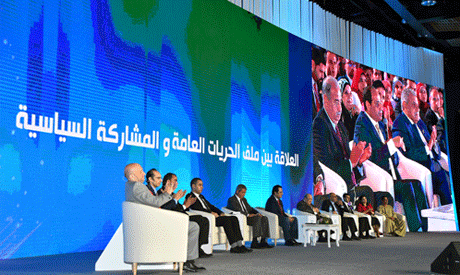
In this photo provided by Egypt's state news agency MENA, Egyptian President Abdel-Fattah el-Sissi, center on screen, flanked by Prime Minister Sherif Ismail, left on screen, and former Prime Minister Ibrahim Mehleb, right on screen, attend a conference on youth with participation by top Egyptian officials and political figures in Sharm El Sheik, Egypt, Wednesday, Oct. 26, 2016. (AP)
The National Council for Human Rights will collaborate with Egypt's parliamentary human rights committee on an initiative to compile a list of young people detained for political reasons to be released according to the recommendations of the National Youth Conference held in Sharm El-Sheikh in October, Council member Mohamed Abdel Aziz told Ahram Online Sunday.
This initiative is not the first; presidential promises to release detainees were given in December 2014, January and February 2015, and June 2016, but the only pardon implemented so far is decree no. 368, issued in September 2015, which released 100 prisoners including most of the detainees in the Shura Council and Ittihadiya cases.
"What gives strength to this initiative are three main guarantees: first, that the President expressed his concern on air; second, the involvement of political powers and parties, especially young party members who can better represent the case of young detainees to the Presidency; and third, the presence of two important institutions working on this initiative—the National Council for Human Rights (NCHR), and the parliamentary human rights committee," Abdel Aziz said.
The initiative comes amid repeated international criticism of the increasing number of political detainees in Egypt.
As of now the list will include only detainees whose trials are pending. Notable cases pending trial today include Aya Hegazy, the founder of Belady foundation for street children, who holds both Egyptian and American citizenship and has been detained with her husband since May 2014, as well as Mahmoud Abou Zeid Shawkan, a photojournalist arrested at the Rabaa Al-Adawiya sit-in dispersal in August 2013.
The exact number of young people held without trial for more than one year is not clear, however pressure groups say they have compiled long lists of detainees who fit that description.
The list will exclude detainees who have received final sentences, such as activists Alaa Abdel Fattah, who received a five year sentence in the "Shura Council" case, Ahmed Maher, who is serving a three year sentence for violating the 2013 protest law, and Ahmed Douma who received a life sentence for rioting, inciting violence and attacking security forces.
"This time is more confusing," said Khaled Abdel Hamid, the spokesperson of the Freedom for the Brave campaign, referring to the exclusion of already-sentenced detainees.
His campaign is in contact with the NCHR, but will not submit a new list of detainees, having already helped the council draft a list of 600 names, Abdel Hamid explained.
"We have submitted several lists of detainees before, prioritizing those with health problems, students, and children. We welcome any attempt to release even one prisoner, even though this will not meet our demands for justice and freedom for all" he added.
According to Abdel Aziz, the new initiative will proceed in two phases. In the first phase the committee -- which will be headed by Abdel Aziz and include youth representatives as well as members of the NCHR and the parliamentary human rights committee -- will deliver a list of detainees pending trial. In the second phase the committee will begin a discussion with the president to include the names of those already sentenced.
While the final criteria for inclusion is yet to be decided, the initiative will likely prioritize detainees with health problems, cases with difficult circumstances — such as having two members of the same family in detention — and students, Abdel Aziz said.
The Stop Forced Disappearance and the Bond of Forcibly Disappeared Families campaigns called on families to send letters on Sunday and Monday to the president and to the NCHR to include the names of their forcibly disappeared relatives among the names of the youth to be released.
"The scope of the committee's work will be limited to detainees," Abdel Aziz told Ahram Online, in response to the calls to include the forcibly disappeared, explaining that it's a different file, and that "there is a difference between international and local standards of defining forced disappearance."
The Ministry of Interior repeatedly stresses that there are no cases of detainees held without charge.
Some families have begun posting calls to the president on social media, including the details of their forcibly disappeared relatives, including lawyer Ashraf Shehata's wife, Maha El-Mekkawy, who, according to a statement she posted on Facebook last Wednesday, has been held for 1017 days at national security buildings and prisons without being registered or accounted for.
"The calls on social media were Hanan Badr's idea, wife of Khaled Hafez, who has been forcibly disappeared for 3 years. She wanted forced disappearance to have a place in the initiative along with detainees, " said Abdel-Rahman Gad, a member in Stop Forced Disappearance (SFD) campaign.
"We submitted all our reports to the NCHR, and they received the latest annual report last August, in which we documented 912 cases, but there is great confusion in the council over how to define forced disappearance. They adopt in their reports the official description of the interior ministry, which labels the disappeared either as fugitives, held pending trial, or lost," Gad added.
He said the SFD campaign believes the council should take into consideration that the Ministry of Interior is the body accused of carrying out disappearances, therefore its definition of the term should be questioned.
The SFD campaign is ready to deliver a list of almost 100 names today to the national council, but Gad does not expect much of the current initiative. "We are just taking the chance to apply pressure and show support for the families of the forcibly disappeared," Gad concluded.
Short link: